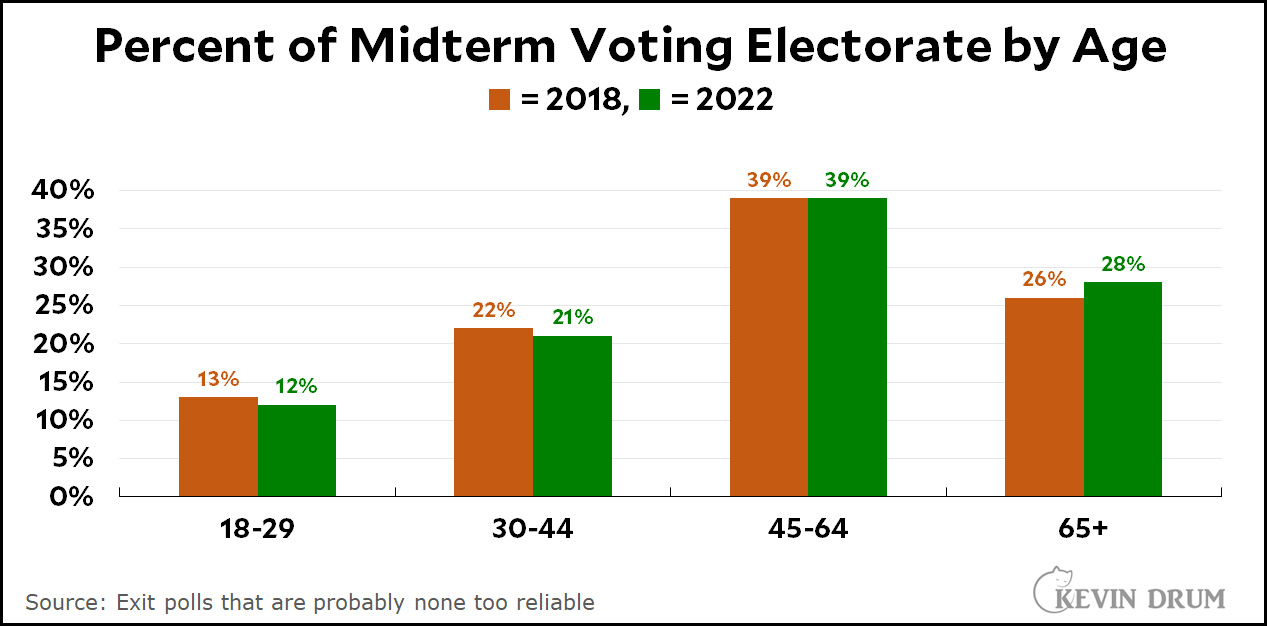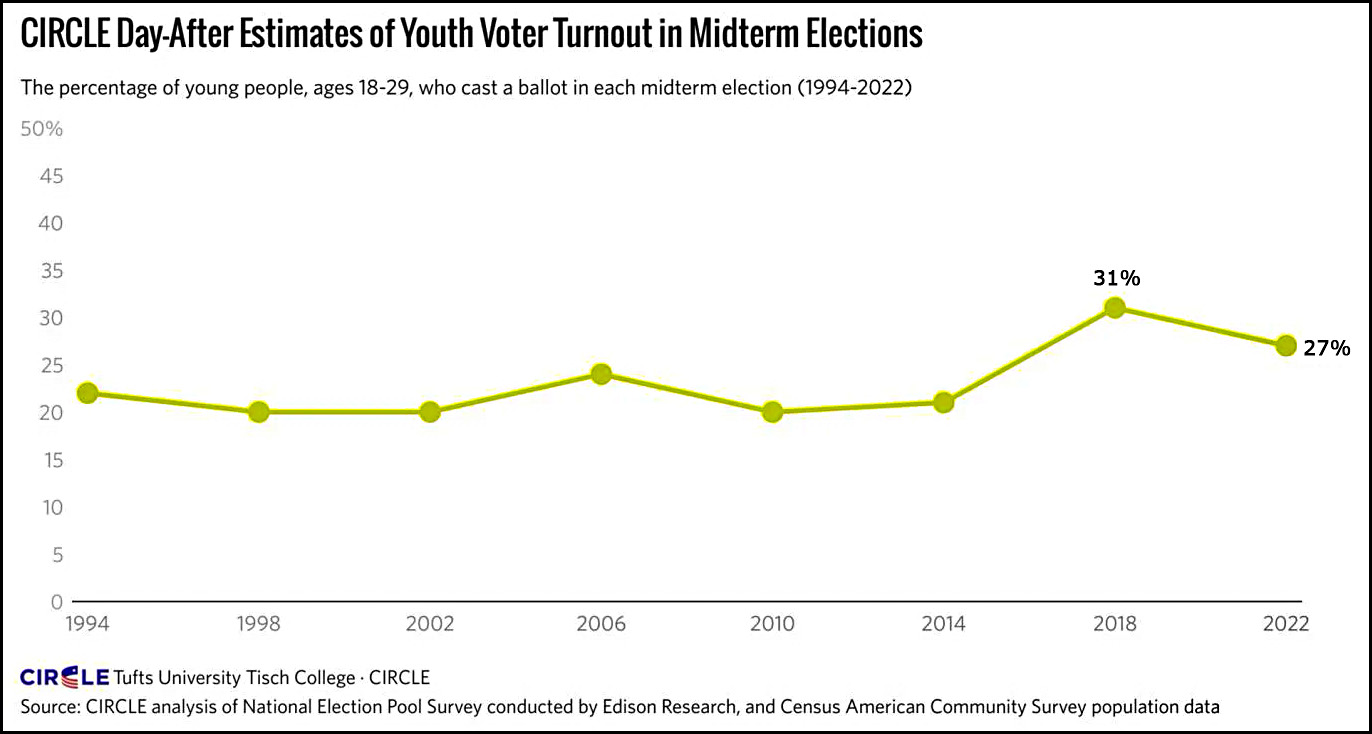Twitter is full of people talking about a huge uptick in youth turnout in Tuesday's midterm election. This is typical:
The story about last night's unusually high under-30 turnout is not "young people showed up to save democracy." It's "young people were treated as a constituency with valid needs, so they finally had a reason to show up."
— August C. Bourré (@FishSauce) November 9, 2022
This would be wonderful if it were true, but unfortunately it ain't true. Read all the way to the bottom for more, but here's the basic data we have so far:
 The share of young voters is lower than it was in 2018 while the share of old voters is up. For those of you who scoff at simple-minded analysis like this, here is David Shor with something so sophisticated it's almost impenetrable:
The share of young voters is lower than it was in 2018 while the share of old voters is up. For those of you who scoff at simple-minded analysis like this, here is David Shor with something so sophisticated it's almost impenetrable:
There was no "Youthquake" - turnout relative to 2018 was strongly associated with age, with turnout increasing starkly in older counties and decreasing the most in younger counties. pic.twitter.com/uElbXisUkI
— (((David Shor))) (@davidshor) November 10, 2022
Shor's scatterplots show that as the ratio of 2022 voters to 2018 voters gets larger, the percentage of young voters gets smaller while the percentage of older voters gets larger. In other words, more old voters and fewer young voters.
Even CIRCLE, which never misses a chance to hype the youth vote, admits it's way down from 2018. I have helpfully added the 2018 number to their chart:
 It's true that 2018 was a huge year for liberals, but that's still a pretty big decline.
It's true that 2018 was a huge year for liberals, but that's still a pretty big decline.
One other thing to note is that news reports say that Republican turnout increased more than Democratic turnout. The big difference, apparently, was in middle-aged independents, who are associated with neither youth nor progressives.
Now for the big caveat: I don't know what the source is for all these charts, but it's probably exit polls, which is just about all we have right now. Unfortunately, exit polls are notoriously unreliable, especially the initial releases. What's more, I imagine that exit polls are getting worse over time as in-person voting declines.
What I'm saying is this: the evidence suggests that the youth vote was down, and that's all we have right now. Nobody should be claiming otherwise unless they have some solid data to back themselves up.
At the same time, the picture may change over the next few months. So don't say that youth turnout is up, since there's zero evidence for that, but be careful about saying it's down since there's only unreliable data available right now. In fact, it's probably best not to say anything at all.

What was the voting split of the younger vote in 2018? Some of the analysis I had seen praising the youth vote this election was based on the overwhelming split towards Democrats, which certainly played a role given how close some of the races have been.
I'll bite.
The early-vote data compiled by Tom Bonier (et al) at TargetSmart, although nationally showing an overall nominal decrease in the youth vote, still overall showed a significant percentage shift from the GOP to Democrats in the 18-29 age bracket (2018: 61.1D, 28.7R, 2022: 63.0D, 23.0R). Their data also shows significant nominal increases in the youth vote in precisely those states where Democrats ultimately performed best, like Michigan and Georgia.
There's murkiness in exactly how this data gets determined, but the election results seem to reflect the tendencies revealed in their analysis. Take a look for yourselves:
https://targetearly.targetsmart.com/g2022
still overall showed a significant percentage shift from the GOP to Democrats
Persuasion works!
Can we trust exit polls at all? Hard to imagine how they can be done accurately. How do they capture the mail-in vote, for example? That's how my Millenial children vote.
Meh. I think it's best understood in reference to the flat trendline prior to 2018, rather than in comparison to 2018. Sure, it's down compared to 2018 assuming these numbers are accurate-ish, but it's still significantly up since every midterm ever* prior to that. The only time prior to 2018 that it jumped upwards at all was 2006, which was another notable anti-Republican sentiment moment in the country. Like all the young folk (I should say "us young folk" as 2006 was the first time I could actually vote) suddenly woke up and decided that they were getting screwed by Republicans, so they voted. And then 2018 is clearly a Trump effect, like they're finally realizing what the rest of us have known for 20+ years: that Republicans must be kept out of office at all costs. I see this year's turnout numbers as an encouraging sign that more young people are going to vote in coming midterms as well.
*in decades, anyway.
I think canceling student debt was a net harm for Dems. I heard a lot more anger about that than happiness.
This is no comment about the justice of the policy, just the politics.
The big criticism I heard on student debt is why didn't they do it a lot earlier before the rightwingers had a chance to organize against it. It is hugely popular among young college educated people.
So it's hugely popular among people who already vote Democrat?...
Uh, I think someone doesn't understand the rules of the game...
There's more votes in encouraging supporters than in dissing them.
Too bad. Being a single issue voter doesn't add a lot of value. It also generally reveals a big gap in understanding the underlying issue and thus they vote reactively (makes you prone to poor emotional choices).
Populist love this and lean into it.
Negative review bias. Those upset are the loudest, and the media loves to highlight them.
"Percentage of Midterm Voting Electorate by Age"? What a weird metric. People change age groups all the time. You could get the same effect by having baby boomers aging into the 65+ category and the baby boom echo aging into 30-44. This says nothing about whether young people, 18-29 are more or less likely to vote.
"This would be wonderful if it were true"
Why?
I do not get this worship of youth as these paragon voters who carefully weigh every option then make the wisest possible decision for the future of the nation. Youth are just like non-youth except with much less life experience and thus much more susceptible to random claims that come packaged in shiny boxes.
Whatever random extremist nonsense has been peddled over human history, whether bolshevism, iranian revolution, naziism, khmer rouge, cultural revolution, and so on, it's always the under-30s who are the most eager to lap it up and most willing to go along with its atrocities. And even in the milder-stakes forum of US voting, I see zero evidence for the special wisdom of the youth compared to the rest of us.
You're being rather disparaging with your generalizations. Perhaps you've fallen victim to some random claims that come packaged in shiny boxes.
Also, ticking the correct box now is not exactly an Einstein-level decision. It's literally vote against Republicans. That's it. The yutes get it by a wide margin, more so than the older folks who still believe in the myth of bipartisanship, as evidenced by the 20-point split in the younger vote.
The source at the link says this is the 2nd-highest youth turnout in 30 years of midterms, after 2018, so showing that turnout is down from 2018 doesn't exactly refute the point that turnout was high. That said, I'd have questions about any measure of youth turnout based on exit polls since voting at polling places on Election Day is heavily skewed toward older and Republican voters.
I take all talk about Dems doing better or worse with group A or B with a grain of salt. I've heard segments on NPR* about how bad Dems are doing with Latinos you would think Latinos must heavily skew toward the GOP. But Latinos are still voting for Dems by and large, and roughly in percentages that are comparable to the past. (If you look at voting patterns back to the '90s, Latinos do tend to vote for incumbent presidents in higher numbers. Maybe that's a function of name recognition, but it would account for a tick up in 2020 for Trump. If that pattern holds, Biden may get a bump in 2024. But the media coverage about the Latino vote is always "the sky is falling" for Democrats.)
Some post-election coverage is about who won, what happens next, etc. But a lot of it is about creating or reinforcing "the narrative" that different observers want to promote. Some of it is data-driven, some data-independent. I'm pleased that the emerging narrative is that Democrats "won" on Tuesday. It's a good thing the GOP has gotten a comeuppance, and that the prevailing analysis is that they screwed up, Trump is a loser, and that voters in this country are tired of putting up with their crap anymore. There's good solid evidence for that too: Biden's Democratic party did better in its first midterms than any Democratic party has done in ages.
But a lot of the new narrative is driven by the failure of the GOP to meet the extraordinarily high and unrealistic expectations that they themselves created. The talk of a "red wave" (or "tsunami") was always garbage. This election was never going to be that, even if you paid attention to the skewed GOP polls.
The first ingredient for any wave election is that the opposing party won in high numbers in the election before. But in 2020, when Biden defeated Trump, Democrats lost a dozen or more seats in the House. That meant many fewer vulnerable Dems who represented red districts, and going into these midterms the opportunity for gains for even a competent GOP were limited.
Had a different GOP talked instead about 2022 being a close election, they might instead have been able to take winning one house of Congress as a victory. But now, even if they take the House, this election will go down as one of the great fuck-ups in modern politics.
* I listen to NPR in the car every day, and here's the gist that listeners are hearing: Biden is toast in 2024 and DeSantis is our next president. They're giddy about it. Just like they were giddy about Dems getting a whomping in the 2022 midterms.
The point is: what's the TREND?
Most likely is that Trump was sui generis, for better or worse he "inspired" more than the usual number of youth voters, and with him out of the way things will return to their usual level of apathy.
If you're going to argue against this, you have to give a plausible REASON for why the youth attitude to voting over, say, the next decade, will be different from what it was between say 2004 and 2014.
I have no idea what you think I'm arguing against or why you're arguing with me.